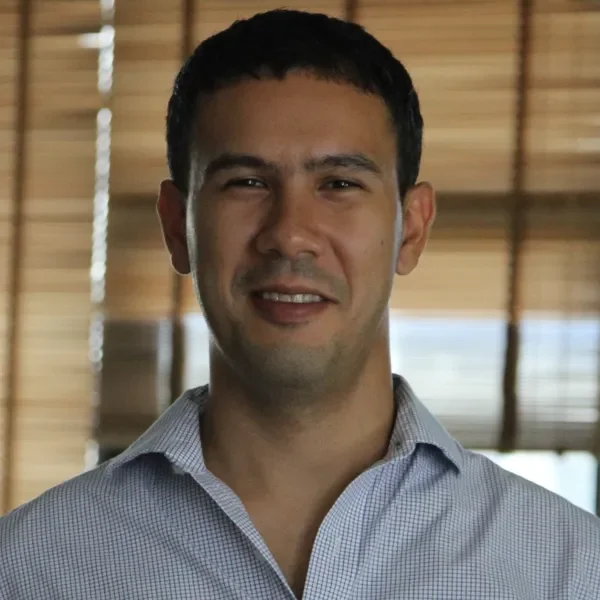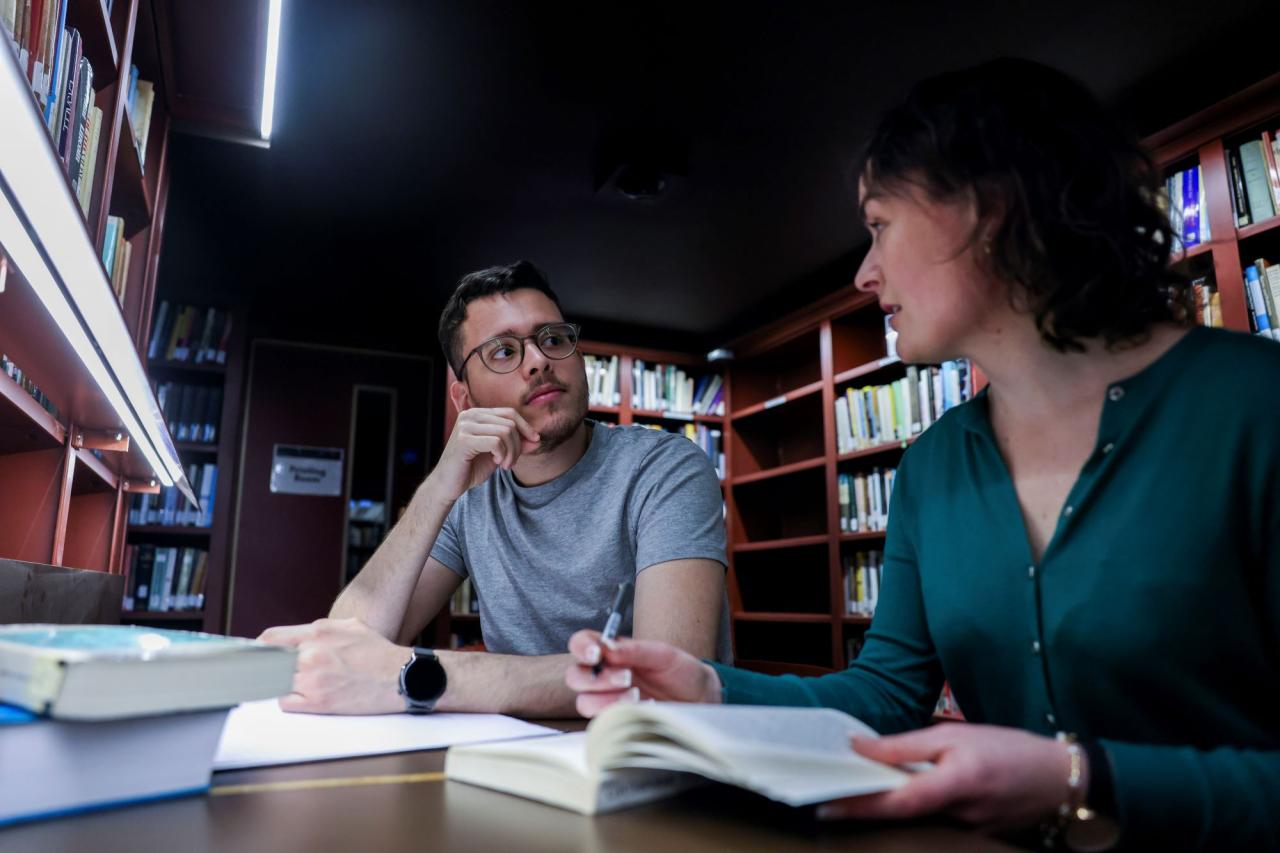Overview
The MA in International Security and Conflict Studies aims to provide you with the knowledge and skills to analyse these issues in our highly interconnected world.
Here are some questions you'll explore:
- Why do people feel threatened?
- How do certain groups manage to resolve their differences?
- What impact does peacekeeping have?
- How does online radicalisation play a role?
- What are the effects of international treaties?
This programme helps you make sense of these complex issues and equips you with the tools to understand and address them in our globalised society.
We're delighted to welcome students from all over the world to join us. Many of them have experience in fields related to conflict or security, while others may have studied different subjects but are genuinely interested in this area.
Our professors are actively researching various topics such as the connection between politics and economics, human rights, conflict resolution, rebuilding after wars, justice during transitions, and the study of specific regions.
In the classroom, we encourage vibrant discussions to provide you with opportunities to explore and learn collaboratively with your peers.
Why DCU
DCU People

Dr. Danny Marks is an Assistant Professor of Environmental Politics and Policy in the School of Law and Government of Dublin City University.
Read more about Dr. Danny Marks
Careers & Further Options
Careers
The MA in International Security and Conflict Studies appeals to both recent graduates and individuals who are already well into their careers. It's a versatile programme suitable for students with diverse academic backgrounds, such as politics, law, history, languages, as well as those with practical experience in fields like policing or security forces.
The knowledge and skills gained from this programme are in high demand across various sectors, including government agencies, research organisations, both national and international non-governmental (NGO) and non-profit organisations, inter-governmental (IGO) organisations, as well as policing and security forces.
Graduates from this programme pursue diverse career paths. They can be found working in various government departments such as the Department of Foreign Affairs, the Department of An Taoiseach and the Department of Justice. Some also join the ranks of the Defence Forces and An Garda Síochána.
Internationally, opportunities exist within organisations such as the European Union and the United Nations. Others might choose to work with agencies and non-governmental organisations (NGOs) such as Trócaire, Amnesty International, Concern and Oxfam.
Alternatively, graduates can explore roles in major multinational corporations, the media industry, or think-tanks. The versatility of this programme opens doors to a wide range of fulfilling career paths.
Entry Requirements
For admission to the MA in International Security & Conflict programme, successful applicants will have:
• A degree at the level of an Irish or UK Honours undergraduate degree (H2.2 or above) or equivalent, OR
• Applicants with appropriate combinations of professional qualifications and experience may also be considered. This includes discipline-specific knowledge and know-how; transferable skills; basic research competency; personal effectiveness.
• Recognition of Prior Learning (RPL) applicants are required to submit a cover letter along with their application under the Transcripts section of the portal, affirming their intent to apply for RPL. For more information on RPL see here.
• International candidates who are non-native speakers of English must satisfy the University of their competency in the English language.
Programme Structure
You have two ways to complete this MA: in one year if you study full-time or in two years if you study part-time. The academic year begins in the middle of September.
As a full-time student, you will take three core classes in the first semester, along with a research methodology class. In the second semester, you will select three classes from a range of topics. You will also need to complete a 15,000-word dissertation, due in September.
If you are a part-time student, you will spread out all the classes (three core, one research methodology, and three optional classes) over two years, typically taking one or two classes each semester. Your 15,000-word dissertation will be due in August of your second year.
Also if you choose the part-time route, the required classes and some of the most essential optional ones are typically scheduled on a single afternoon or evening each week, running from 2 pm to 8 pm. Depending on the specific optional modules you pick, part-time students usually won't have any scheduled activities outside of these hours.
Throughout the programme, seminars and guest speakers, including politicians, officials, academics and diplomats will help you explore essential issues in international politics, security and development. These sessions also provide valuable networking opportunities.
Mandatory Modules:
- Research Methodology
- International Security
- Resolving and Managing Conflict
- International Law and Conflict
- Dissertation
Choose 3 optional modules:
- International Security: Critical Approaches
- Environmental Change and World Politics
- Emerging Issues in Security
- Race, Minorities & Indigenous in Int'l Law
- Counter-Terrorism in Europe
- The Governance of Migration in Europe
- International Development Practice
- Russia & The Former Soviet Space
- Irish Foreign Policy
- Conflict, Security and Peacebuilding
- Statehood and Recognition in World Politics
- Political Terrorism
- Politics and Development in sub-Saharan Africa
- Politics of the UN
- Politics of the Middle East and North Africa
- War and Peace in South Asia
- Connect Theory, Policy, and Practice: We bridge the gap between theory, policy and real-world practice
- Provide Top-notch Academic Training: We offer excellent academic training in international security
- Foster Critical Understanding: We help you develop a deep understanding of various theories and frameworks in security and conflict studies
- Boost Practical Skills: We improve your practical skills in research, communication, policy analysis and programme management
Explore Globalization's Impact: We delve into the security and conflict challenges and dynamics created by the interaction of global and national forces.
- Leading in Ireland: DCU’s School of Law and Government is Ireland's top place for studying international development, environment and conflict
- Innovative University: DCU is a modern and innovative university known for its excellent teaching and research. It is ranked in the top 100 in the Times Higher Young University rankings
- Highly Respected MA: Our MA programme is highly respected both in Ireland and internationally. It offers a challenging and creative learning experience
- Deep Knowledge: You'll acquire extensive knowledge in international development, environmental issues, conflict and security studies, and how these areas shape today's global politics
- Career Boost: You'll build your career by establishing relationships and connections with experts and policymakers from diverse fields
Path to Further Studies: Completing this programme opens doors to further postgraduate studies in areas like International Development, Environmental Studies, Political Science, International Relations, and Security Studies.
- Comprehensive Understanding: You'll acquire in-depth knowledge of the political, social, economic, historical and cultural factors that shape the international security system, including organisations and laws related to armed conflict
- Focus on Current Issues: You'll also delve into contemporary international security topics such as peacekeeping, terrorism, failed states and human security
- Path to Further Studies: Completing this programme opens doors for further studies in Conflict Studies, International Relations, Peace Studies, Political Science, Security Studies, Strategic Studies and Terrorism Studies
- Interactive Learning: Expect hands-on, interactive learning in small groups, which provides a unique educational experience. Additionally, you'll establish valuable connections with peers from diverse backgrounds and areas of expertise
Career Advantage: This programme gives you a head start in your career, thanks to the relationships you'll form and the practical skills you'll develop.
Fees and Funding
Fees
How To Apply
To apply for this programme:
All Applicants must apply through DCU's Student Application Portal which is available here. Here's a quick step by step guide if you need help with your application:
- Provide Academic Transcripts for each and every year of study with English translation if applicable.
- If applicable, evidence of competence in the English language as per DCU entry requirements. Please see link http://www.dcu.ie/registry/english.shtml
Application Deadlines
Applications will be accepted on a rolling basis until the programme is full or until the following dates:
- Closing date for non EU applicants is 1st July 2025
- Closing date for EU applicants is 30th August 2025
Note applicants who require a study visa for the purposes of studying at DCU, are advised to apply as early as possible.
Please note if you are a non EU student and require a study visa, you are not eligible to apply for part-time programmes as study visas are only granted for full-time programmes.
All entry requirements should be met before the commencement of the programme.
Application Queries
For EU applicant queries, please visit https://www.dcu.ie/registry/eu-postgraduate-taught-admissions or email postgraduateadmissions@dcu.ie
For non EU applicant queries, please visit https://www.dcu.ie/registry/international-admissions-undergraduate-and-postgraduate or email internationaladmissions@dcu.ie
Commencement of Programme
The programme commences in September 2025
Life On Campus
At DCU, our students can expect a unique campus experience. We are known for our excellent teaching and learning facilities, our active clubs and societies, and our great social and sporting facilities. All this makes DCU an exciting place to be.
DCU has three academic campuses; Glasnevin, St. Patrick’s and All Hallows (both in Drumcondra), all close to Dublin City centre.
They can be reached by public transport, Dublin Bus and Bus Éireann, with our Drumcondra campuses a ten minute walk from Drumcondra Train Station. Glasnevin is a 20 minute walk from St Patrick’s and All Hallows. They are also linked by Dublin Bus.
Each campus has a library (O’Reilly, Cregan and Woodlock Hall), study spaces, restaurants, and on-campus residencies. There are sports facilities on Glasnevin and St. Patrick’s, and there is a dedicated sports campus, St Claire’s, located near Glasnevin on the Ballymun Road.
DCU’s 19,000 students have access to exceptional teaching and learning facilities across our three academic campuses.
These include modern learning theatres, research centres, a new media and TV studio, radio/podcast studios, computer suites and advanced labs in the areas of Languages, Engineering, Physics, Chemistry and Biotechnology, as well as a Sports Performance centre and a training hospital ward. In 2021, we opened our first virtual reality ‘Leadership Lab’, which is located in our Business School.
We continue to improve and update our facilities. For example, construction of a new world-class STEM facility is underway on the Glasnevin campus. With capacity for an extra 3,000 STEM students, this facility will advance DCU’s international reputation for excellence in science and health, computing and engineering disciplines.
Studying in DCU isn’t just about course work. The university is rich in student life and activities.
There are more than 140 clubs and societies for students in DCU, with ‘Clubs & Socs’ days taking place on both the Glasnevin and Drumcondra campuses at the start of the academic year. They span everything from rugby to rock climbing, anime to jazz.
For many students, sport is an important part of the DCU experience. DCU’s Sports Complex boasts a 25 metre swimming pool, fitness centre gym, all-weather pitches and squash courts, as well as soccer, GAA and rugby pitches. DCU Dóchas Éireann, the university’s GAA club, is the largest third level Gaelic Games club in the country. Meanwhile, DCU Athletics has been Ireland’s highest achieving university club for many years. And DCU has dozens of other clubs to get involved in, from Archery to Weightlifting.
The Glasnevin campus is home to our purpose built, state-of-the-art student centre, The U, which serves the needs of a rapidly growing student body. Here, you will find the Student Leadership and Lifeskills Centre, performing arts and cultural spaces for students and the wider community, and the Entrepreneurship and Innovation Hub. Also located on our Glasnevin campus is The Helix, our renowned performing arts centre.
On our St Patrick’s campus, we have the Java Student Hub, a vibrant, warm and welcoming space where students can meet for coffee, play music, use the projector to watch events, or just relax. The walls of the Java Hub were designed based on the cultural history of St Patrick’s Campus, including the special references to the notable sporting history and history of the arts.
We have a number of academic, professional and social supports for students.
Student Advice & Learning Skills Centre - Offers a wide range of supports and services to students and advice
The Writing Centre - drop-in writing workshops for students through the academic year
Maths Learning Centre - provides maths support for students of all ability levels with maths modules
Student Learning - facilitate the transition from passive to active learning for students at DCU, by teaching study skills, nurturing critical thinking and building student confidence.
Careers work with students to help them on their professional journey into graduate employment.
Our student support team offers a comprehensive support programme, helping students make that all important transition into university life and focusing on building confidence and skills which are key to success at third level.

DCU Glasnevin Campus
FAQs
Is DCU all one campus?
DCU is a multi campus university - the Glasnevin, St Patrick's and All Hallows campuses. The St Patrick's campus is where the Education courses are taught and some of the subjects from the BA Joint Honours degree. There is a 20-25 minute walk between the campuses but there are buses and bikes available to go between them also.
Click here to see maps of all of our campuses
If I'm studying on the St Patrick's campus, can I use the library and sports centre on the Glasnevin campus?
Yes, all facilities such as sports and accommodation are open for all DCU students to avail of.
Are there libraries in DCU and if they have wifi and work stations?
We have a brand new state of the art four floor library on our St. Patrick's Campus which complements the existing library on the Glasnevin campus. There is free wifi, work stations as well as desktop computers.
Does DCU provide accommodation?
DCU does have on-campus accommodation for undergraduate and postgraduate students, and you can find out more and apply via the Accommodation Office webpage.








